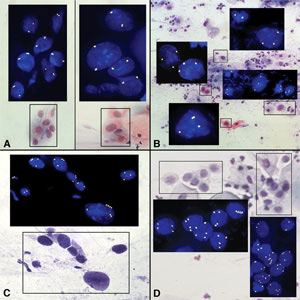
The new technology, developed by University of Alberta researchers in Edmonton, opens up the possibility of better, faster cancer treatment and greater accessibility to fluorescent in situ hybridization (FISH), a complex test that detects mutations in chromosomes for a number of different types of cancer.
It is based on a microfluidic chip the size of a microscope slide, developed by Chris Backhouse, professor of electrical engineering, and cancer scientist Dr. Linda Pilarski, that can perform FISH on a handheld diagnostic device.
The researchers claim that the new system will allow FISH to be performed within a day for a fraction of the cost of current analysis methods, which take days conduct the test.
The rapid detection of chromosomal mutations with the help of new technology, say researchers, will significantly increase a doctor’s ability to tailor treatment strategies to target individual cancers.
‘The ability to design ‘personalized’ therapies means that patients will be able to receive more effective treatments sooner and avoid exposure to side effects from treatments that will not help them,’ Pilarski said.
‘This is representative of how miniaturization can make our health care more accessible while creating new economic opportunities here in Alberta,’ Backhouse added.
The new technology has been hailed by the scientist fraternity.
‘The work of Dr. Pilarski and her associates will have great impact, and quite quickly – on the diagnosis of patients with a broad spectrum of diseases,’ said Dr. Roderick McInnes, Scientific Director of the Canadian Institutes of Health Research Institute of Genetics.
